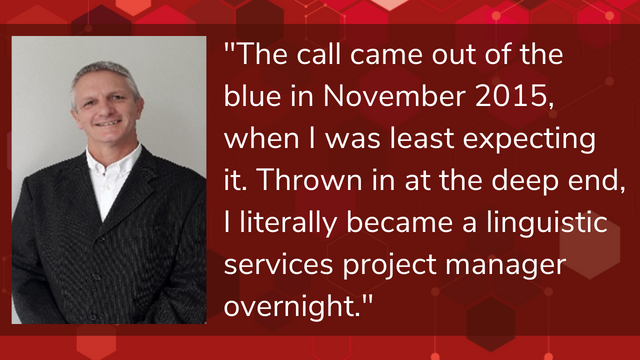-
QUALIFICATIONS
- For Linguists Worldwide
- For UK Public Services
- Preparation
- Policies & Regulation
-
MEMBERSHIP
- Join CIOL
- Professional Membership
- Affiliate Membership
- Chartered Linguist
- Already a member?
- Professional conduct
- Business & Corporate Partners
-
LANGUAGE ASSESSMENTS
- English
- All Other Languages
-
CPD & EVENTS
- Webinars & Events
- CIOL Conferences
- Networks
- CIOL Mentoring
-
NEWS & VOICES
- News & Voices
- CIOL eNews
- CIOL Awards
- The Linguist Magazine
- Jobs & Ads
-
RESOURCES
- For Translators & Interpreters
- For Universities & Students
- Standards & Norms
- CIOL & AI
- All Party Parliamentary Group
- In the UK
- UK Public Services
- Find-a-Linguist
Working with Switzerland after the Brexit transition
By Emma Gledhill MCIL CL
Both Switzerland and the UK are very keen to replicate existing arrangements as far as possible, with the exception of free movement of people. Like the UK, Switzerland has some strong anti-immigration sentiment, not least from the point of view of wage dumping, but has just voted overwhelmingly *not* to scrap freedom of movement with the EU, which would also have terminated all six of the remaining bilateral agreements that came into force in 2002 (Bilateral Agreements I[1]), under a guillotine clause.
Brexit
Switzerland’s government developed a Brexit strategy very early on (called “Mind the Gap”) and an agreement - similar to, and in some ways better than, the EU Withdrawal Agreement - was signed in February 2019. Here is the primary text.
Residence and work
Anyone who is already registered as resident by 31 December 2020 will retain their right of residence, all other rights and their existing permits as if they were EU citizens, and will be able to apply for permanent residence (C-permit) after 5 years in the same way as at present (rather than the more stringent 10-year rule for most TCNs). British C-permit holders will also be able to leave the country for up to 4 years without losing their residence rights or status (previously max. 2 years and only on application for a few specific reasons).
With effect from 1 January 2021, non-resident British citizens become ordinary third-country nationals in Switzerland and subject to the work permit rules for TCNs, under which, by law, precedence in recruitment must be given to Swiss nationals, existing residents and then non-resident EU/EEA/EFTA nationals. This means that non-resident UK citizens applying for jobs in Switzerland will go to the back of the permit queue along with US, AUS, NZ, SA etc. Moreover, the rules for TCNs under which self-employment is not permitted until permanent residence (C-permit) is achieved (unless married to a C-permit holder or Swiss citizen) is likely once again to apply to newly-arrived UK nationals in the same way as it did before the bilateral agreements came into force in 2002.
Here is some general information on admission of non-EU/EFTA nationals to the Swiss labour market, and here are some FAQs.
Family reunification
Non-resident spouses of British citizens and children who are up to the age of 21 or dependent, regardless of nationality, will be permitted to join their family member in Switzerland (and vice versa for Swiss citizens in the UK) after the end of transition. The same applies to dependent family members in the ascending line, but the dependency must be demonstrated as at present. In the case of spouses, this is providing they were married before 31 December 2020 (no time limit for subsequent reunification) or marry and apply for residence within five years after the end of transition. If you marry your spouse in the five years after the end of transition but don’t apply for them to join you until after that deadline, TCN rules apply.
See Article 10 pages 5-7 of the primary text.
UK/CH cross-border service provision
Under the agreement, in-person cross-border services between the UK and Switzerland may continue to be provided in the territory of the other country for up to 90 days a year providing the written contract to do so is in place and work has actually started before 31 December 2020.
See Chapter 4 on page 15 of the primary text of the UK-CH agreement linked above.
As things stand, any contracts signed after this date will be subject to the laws applicable to third-country nationals as no arrangements have yet been made to the contrary. TCNs (including British nationals) can also be deployed to Switzerland for up to 90 days a year by an employer established in the EU/EFTA provided that the TCN or British national has lived in that country for at least 12 months. This does not apply to the self-employed.
Therefore, any UK citizens wishing to move to Switzerland would be well advised to do so before the end of 2020 if they can, and those wishing to provide in-person services from the UK will need to ensure that a contract is signed and work starts before 31 December 2020.
Here is some general info on working in CH as a TCN (i.e. for UK citizens from 1 January 2021).
N.B.: Unlike the EU Withdrawal Agreement, which does not allow for any work in the EU without a work permit, Switzerland allows TCNs to work without a permit for up to 8 working days per calendar year - see page 4 of this brochure.
Cross-border service provision by British nationals living in Switzerland
Switzerland has a whole host of bilateral agreements with the EU, including on the free movement of people. Swiss firms are covered by the CH-EU agreements on free movement and can deploy their staff to deliver services into the EU for up to 90 days a year. However, it is still unclear whether individual EU countries will require work permits for British citizens providing these services on behalf of their employer. Given that the minimum investment to set up a limited company in Switzerland is CHF 20,000 (nearly £16,900 at the time of writing), of which no more than 50% can be in kind (at least 50% must be in cash), it is questionable how many freelancers will be working under this corporate form.
In light of the lack of relevant provisions in the EU Withdrawal Agreement, self-employed UK citizens in Switzerland may no longer be able to provide in-person cross-border services into the EU after the end of 2020 unless they can make a case that they are an existing frontier worker (in which case they probably need to work under the aegis of an existing business or businesses established in one or more EU countries).
N.B. It is unclear as to whether a Swiss sole tradership or one-person limited company counts sufficiently as a Swiss firm deploying staff. This would certainly be an area where specialist local legal advice would be strongly advisable, if not essential.
Recognition of professional qualifications
The UK-CH agreement specifies that qualifications that have already been recognised before the end of transition will retain that status. Moreover, those who have obtained qualifications prior to the end of 2020 but not yet applied for recognition and those who have started but not yet completed qualifications (and hence not yet applied for recognition) before that date have a period of 4 years after the end of transition to apply for their qualifications to be recognised.
See Part Four (page 23 onwards) of the primary text of the agreement.
Future arrangements
Nothing has been agreed with the EU yet regarding service provision by UK firms and individuals (including those resident in Switzerland) in the EU from 1 January 2021. This is subject to the continuing negotiations under way in Brussels.
Nothing has been agreed yet regarding service provision in Switzerland for new contracts from 1 January 2021, although options are being explored. According to the British Embassy, many services will continue unaffected as there are no Swiss-EU service agreements in place currently (apart from the 90 days one), so much activity will continue as it does now under WTO terms.
In short, future arrangements in respect of British freelance translators and interpreters (both in the UK and Switzerland) working in EU countries are totally uncertain at present, unless you can claim frontier worker status under the EU Withdrawal Agreement. The whole situation is still unclear even to the British Embassy in Switzerland, as the status of EU trade negotiations is still unclear.
What does all this mean for translators and interpreters?
Bear in mind that EU free movement rights have only existed in Switzerland since 2002 when the bilateral agreements with the EU came into force. Therefore, there is plenty of recent precedent to fall back on as to how UK citizens will be able to work with Switzerland in the future.
For translators
There was never any problem for UK translators in the UK or EU countries to work in their country of residence for clients in Switzerland: in general, translators working in their country of residence and delivering translations to any other country under WTO terms are fundamentally unaffected since this falls under Mode 1 (cross-border trade) of the GATS definition of services trade[2]. If anything, it was a little easier than with clients in EU countries; as Switzerland is not in the EU, it falls outside the scope of UK or EU VAT. That means there is no VAT to charge on deliveries to clients in Switzerland, and also no VAT form to complete listing work provided for clients in EU countries, along with their VAT numbers, merely a box to check on your VAT return (place of supply rules for the supply of intellectual services)[3]. In this respect, there should be no changes as long as work is not being carried out on-site in Switzerland. Working with clients in Switzerland should function in exactly the same way as working with clients in the US, Australia, or any other non-EU country.
In addition, UK citizens should have up to 8 working days per calendar year during which they can work in Switzerland without a permit (e.g. for meetings, occasional on-site work at client premises).
The only change will be the loss of the facility, granted to EU citizens, to work for up to 90 days without a permit subject only to a registration system, unless seconded by an employer established in the EU/EFTA. This may have a significant impact on freelancers who work on-site on a short-term contract basis.
For translators in Switzerland, the UK-CH agreement protects existing in-person service provision up to 90 days in the two countries under the terms set out above.
For interpreters
The loss of the registration system will certainly make it more difficult for non-resident UK interpreters to work in Switzerland in person. However, there is at least the 8-day regulation.
It is reasonable to suppose that remote interpreting should function in the same way as translation as a Mode 1 service.
Please note: This article doesn’t constitute formal advice and everyone should take professional advice on their own situation.
Filter by category
More
The Chartered Institute of Linguists (CIOL), Incorporated by Royal Charter, Registered in England and Wales Number RC 000808 and the IoL Educational Trust (IoLET), trading as CIOL Qualifications, Company limited by Guarantee, Registered in England and Wales Number 04297497 and Registered Charity Number 1090263. CIOL is a not-for-profit organisation.







